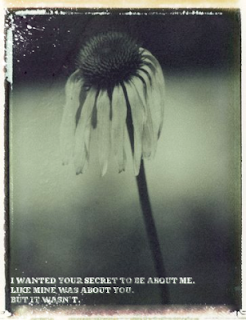Is there a reconciliation that may be found
At the weathered hands of Father Time -
Where hearts are broken beyond remits
Groaning loving-care’s clarion chimes?
Ringing o' ringing in the halls of wear
Unheard a dulled ear’s deaf stirrings -
Unwearied ensnaring grasping fares
Soon ruined a dark reef’s moorings?
Then away, away, come away at once
To faith’s fraught shoals and lauded lands -
Where sycamore trees arise tall bonded communions
And butterscotch'd groves flow o’er grace’s rolling strands.
Bathed in rosetted fugues of cherry blossoms perfuming sweet airs
And there lie 'twining amid the hallowing silences of shrouded black boles -
In spellbound hush o'er lush verdant swards of pilloried souls risen all-glorious
Whence plucked from death’s withering hands and unsparing scythe unreaped.
Lifting as thrice bound sonatas upon forgiveness’ flutes of fruit’d harmonies
Bursting unfettered lo discord’s mighty lairs of chaining darkness -
Ruptured from cold earth's torn despairs and chiming griefs
Forever moored a glad Fellowship’s eternal fortresses.
Nay, if ever a reconciliation ere be found in thee
Pray fall Incarnate Love unsparingly -
Poured from yielded earthen jars of knelling clays
Birthing sweet ambrosial nectars remitting parched souls a’thirst.
- R.E. Slater
Sept – Nov, 2011
@copyright R.E. Slater Publications
AUTHOR’S NOTES
@copyright R.E. Slater Publications
all rights reserved
| The rich black boles of blooming cherry trees |
AUTHOR’S NOTES
I have written and re-written this verse attempting to purge its sealed mysteries into sight for us poor earth-bound souls faithless and benighted in humanity’s withholding cloths of fleshly concerns and mortal pales. I wanted to fashion a poem that collided intense descriptions with lurid imagery, and against irregularly compressed metaphors, again, and again, and again, until we wearied of the words and could only read it numbed and lost within the verse’s sublimity.
I further wished to avoid reading this poem in tripping verse, or in everyday rhyming parlance, and have broken up the meter just enough to momentarily pause the eyes and arrest our attentions. There is, however, a slight cadence that can be found within its phrases when initiated by breathing stops and pauses. I also imposed an uncommon structure onto it that would mash together its sacred thoughts into a blinding composition of white light whose prismatic rainbow is only seen when read more thoughtfully.
Lastly, I wished to convey life’s greater adventures found within the rich compositions of everyday joys and wonders, beheld in the arts, in sound and canvas, horticulture and nature, sacred communions and worship. How each abounds to us at the Divine’s hand as they can abound from ourselves to one another’s hands when practicing the arts of service to one another. For is not the heart of creation like that of its Creator?
Hence, we may deliver life - against death’s imposing grip - when seeking to help and assist those near to us in common ways. Through the simplicities of listening, sharing, respecting, loving. We do this in the knowledge that we are chosen vessels brought into this life to enrich one-another’s lives - however beggarly they may first appear to our sight or circumstances. For it is not the vessel itself that brings life’s fullness to bear, but the ambrosial nectars that that vessel holds within which enriches friendships and fallow, wheel and fortune.
Curiously, this poem’s thematic elements blend in with its visual shape, and when later discovering this I made both one, into a visual poem about becoming jars of clay. For it is in the very act of service to others - and only then - that our true purpose may be found in acts of sharing with one another in a community of common-use pottery. Some dinged up and battered, others enriched and ornate. But no matter, it is the nectars within the vessel that gives all-and-one joy and usefulness. And yet, there are some pots that are cracked, and others that leak, that can give no service to anyone until bound-up and restored into service’s assembly. The metaphor extends even further when considering unused dusty bowls and unwashed pots unprepared for service to anyone until discovered and re-purposed by a fellowship’s divine.
For should we disdain the use of our talents and abilities, powers and resources, knowledge and connections, it is to give harm to our societies forever fraught with greed and ambition, pride and jealousy, unkindness and sin. But to become vessels that pour out grace and mercy, humility and kindness, courageousness and truth, is to present a society of men and women strengthened into living, organic fortresses immovable, beauteous and inviting.
So then, it is not how pretty the pot… nor how banged-up and unpainted the bowl or jar…. Value is not found in the thing itself. But in the vessel’s use and service. A simple thing to explain but one forever misunderstood in practice and practicalities. Be then mere “jars of clay” become vessels useful for service.
R.E. Slater
Nov 7, 2011
But now, O LORD, you are our Father;
we are the clay, and you are our potter;
we are all the work of your hand.
we are the clay, and you are our potter;
we are all the work of your hand.
- Isaiah 64.8
But we have this treasure in jars of clay,
to show that the surpassing power
belongs to God and not to us.
- 2 Corinthians 4.7





